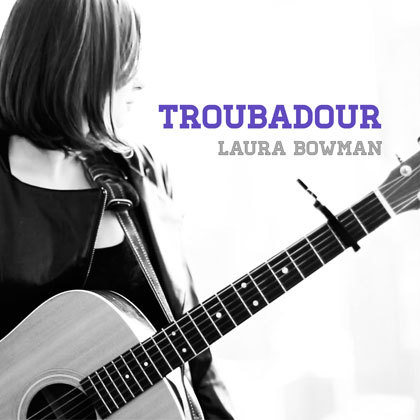In celebration of the release of Laura’s latest musical offering, Troubadour, an EP she conceived while busking her way across america and produced and recorded in collaboration with us here at SOS Studio, we decided to catch up with the songstress and get to know a little more about her, where her songs come from and what it was like working on such a unique, collaborative, project such as Troubadour.

Troubadour is available now at laurabowmanmusic.com where you can also find upcoming tour and live date information.
How long have you been making music and what initially drew you to songwriting?
As a child, I was a cantor in church. I led the songs for masses and ceremonies, and I think that gave me the bug to perform. I’ve been writing songs ever since. I delved deeper into songwriting during my preteen years, and asked my dad for a guitar on my 15th birthday, so I could accompany myself. I wrote songs to escape from what was going on in my life. They were entirely for me alone for a long time. It wasn’t until I got older and started playing in a band that I realized my songs were any good, and started sharing them with others.
Have there been any artists who have been a big influence on you, whether it be lyrically, musically, their style or persona, for example?
I have a secret deep love for Mariah Carey. I learned to sing by emulating her. In the 90’s her voice could do anything, and I was always envious of that, and tried my hardest to imitate what she did. I also went through phases with music. Ben Folds Five lasted a long time, as well as Lisa Loeb and Billy Joel. I always liked songs that were simple and had lots of harmonies. I try to stay uncomplicated with songwriting, and leave space for embellishment later.
Is there a particular process you go through when you write songs, do you normally start with a melody and chords or are the lyrics the first things to come?
I used to write only when I was really upset, when the lyrics and melody would just come to me all at once. I had to write it out or it wouldn’t leave my brain. But now it goes either way. I write more intellectually, formulating an idea rather than being at the mercy of an emotion. The whole of Troubadour was written this way, first with an idea, and filled in with memory and feeling. Often the melody dictates the chords and lyrics simultaneously.
Have you seen a development in your musical style over the years?
I’m just now starting to find my style, after years of playing. I am constantly evolving, and sometimes my music sounds completely different in a matter of months. It rides along with my life experience. The broader my knowledge and the more cultured I become, the more my style changes.
How often do you get to play live and do you have any favourite venues?
I’ve been trying not to play as often in the last six months in the formulation of the album. But I’m about to head out on a Northeast tour in July. I’ll be playing pretty much every day during that time. I like to busk in the subways and perform at open mics when I have free time, and I like a little venue called Bar Nine in NYC. That’s been my most recent hangout for playing live shows.
Is there a venue you would like to play?
I’d really like to play Rockwood Music Hall in NYC. It’s great venue and I’ve been meaning to pursue that for some time.
How has your acting affected your music?
I definitely draw from acting in performances. It helps me remember not to take the crowd at face value. Performing your own material can sometimes be terrifying, and I get stage fright at times. But it helps to rely on my training. I remember that if the crowd doesn’t initially go with me, if I just stay on course, they’ll eventually get on board. People appreciate honesty, whether my style is their taste or not. I just try to be as honest as possible, and remind myself that I’m not pouring my heart out, just letting others take a peek at it for a while.
In the past how have you recorded your songs? In a studio or at home? Was the band recorded live or were all the instruments tracked?
I’ve been in a few typical recording studio settings, but in recent years, I’ve just recorded myself from home. I taught myself Protools and bought enough equipment for a simple high-quality home recording. I did my first album that way, with a few guest musicians stepping in. Everything was tracked in a tiny bedroom in Brooklyn. I find that it’s easier to get good takes if I’m able to do it on my own time. I can really get creative and mess around with weird ideas, because no one else is around to see me fail or succeed
How would you describe your experience recording with SOS Studio.
Recording with SOS Studio has been a really rewarding experience. It’s fun to put out material and be surprised by the contributions to it. Often when you hire a musician to fill in your tracks, they are mostly taking cues from you about what they play. They don’t want to mess anything up in front of you, and often you get less creative results. With SOS, the collaboration happens remotely. So each artist contributing really gets to experiment on their own and mess with ideas until they are satisfied with what they show the recording artist. As a songwriter, that’s really exciting, because you get the end result of having a full band without having to push through the uncomfortable nature of initial ideas and meetings. SOS Studio is professional from beginning to end and I felt very nurtured in the process. I saved a lot of money by not having to rent rehearsal space or pay a mixer separately. I also saved a lot of time by not having to record the other instruments myself, and got better results because I was hiring professionals to achieve that. All in all, I’d do the whole thing over again in a heartbeat. In fact, we’re already in talks to release a full length album together next year.
